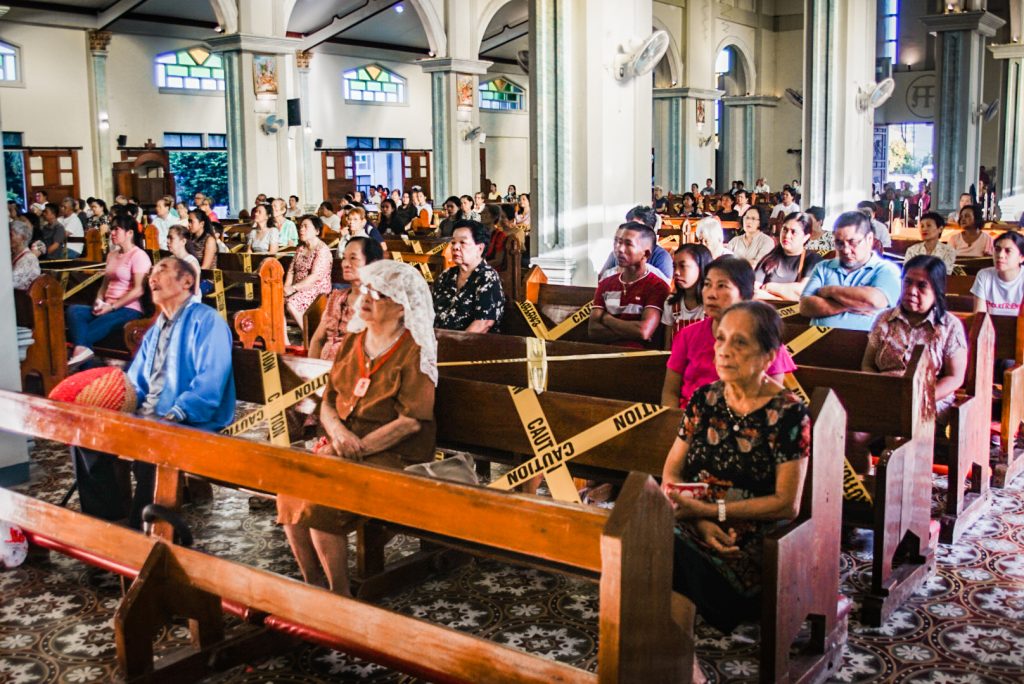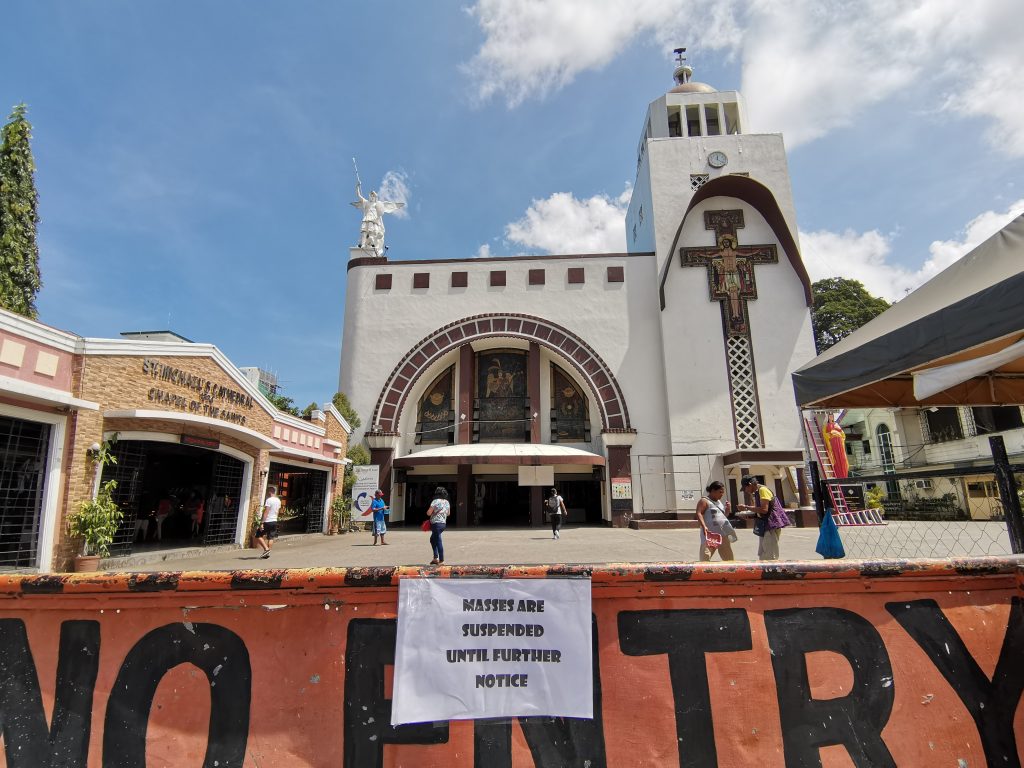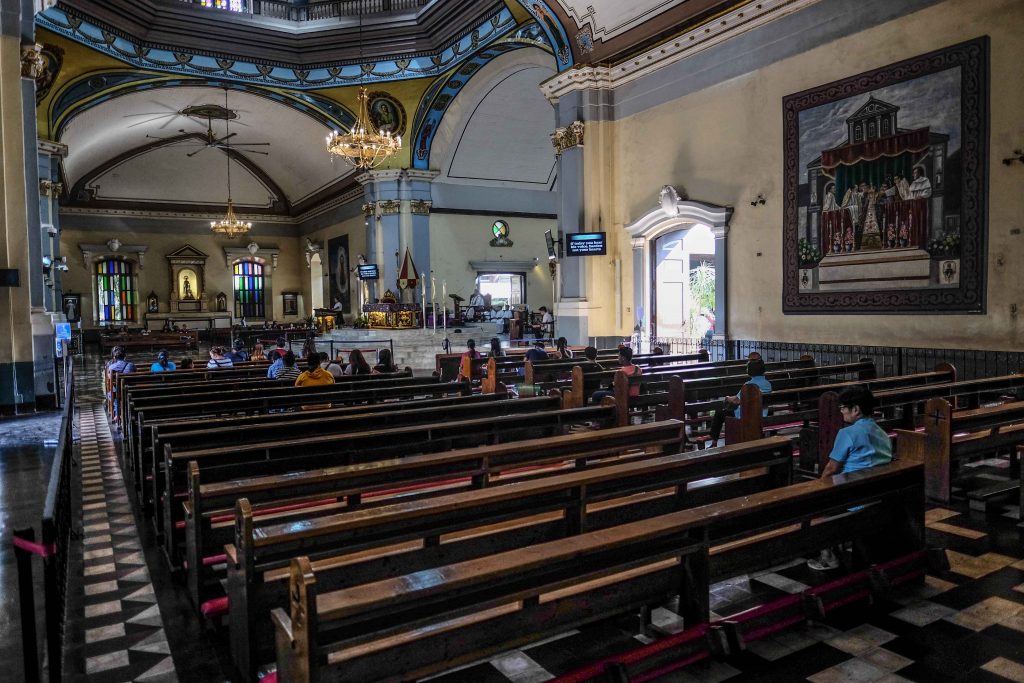Several dioceses across the Philippines have suspended the celebration of Mass in public as authorities ordered the lockdown of Manila to prevent the spread of the new coronavirus disease.
On March 16, bishops in the capital extended the suspension of Mass until April 14 following a government directive to halt large gatherings.
Some dioceses had earlier suspended Mass from March 14-20. The government had previously declared a community quarantine of Metro Manila from March 15 to April 14.
“We will abide by the government’s directive,” read the bishops’ statement on March 16.
“There will be no celebration of the Holy Mass with a large congregation within this period,” it added.
Liturgical celebrations during the Holy Week, which will start on April 5, Palm Sunday, until Easter Sunday, April 11, will not be open to the public.


There will be no public blessing of palms, church visits, public reflections on the Seven Last Words, Good Friday processions, or Easter rituals.
The bishops instead encouraged Catholics to stay home and follow the activities on television, radio, or online.
The church leaders, however, said they will continue to celebrate the Holy Eucharist and Holy Week liturgical celebrations even in the absence of a congregation.
“In spite of the fact that our faithful cannot be physically present in the Eucharistic celebration, the crisis gives us the opportunity to unite ourselves with one another in the bond of spiritual communion through the digital technology,” read the bishops’ statement.
They called for days of penance, prayer, and fasting during all the Fridays of Lent — March 20, 27, and April 3 — including Good Friday, April 10.
The bishops also called for the pealing of church bells at 12 p.m. and 8 p.m.; the recitation of the mandatory prayer and the prayer of the Angelus at 12 p.m.; and the family rosary in the evening.
Attending online Masses
The country’s bishops urged Catholics to make their experience of the celebration of Mass online meaningful, as if they were inside a church.
Bishop Gerardo Alminaza of San Carlos said families can set up a small altar with a crucifix between two lighted candles, where they can gather for the celebration.
He said members of the family can take turns expressing their personal prayers and intentions before Mass, or while waiting for the live streaming to start.


“As in the actual Mass, they should give their full, conscious, and active participation by listening, responding, and doing appropriate gestures at various parts of the Mass,” said the prelate.
Bishop Broderick Pabillo, apostolic administrator of Manila, said Catholics should conduct the Mass readings before the celebration.
“During Communion, make a spiritual communion inviting Jesus in your hearts. After the online Mass, read again the Gospel and reflect on it,” said Bishop Pabillo.
He said the faithful must remember “that you are praying the Eucharist with many other Catholics, not just in the country, but all over the world.”
Bishop Ruperto Santos of Balanga urged the faithful to get rid of “distractions” during the celebration by putting aside mobile phones and by abstaining from television.
He said the cancellation of Masses in churches and the implementation of a community quarantine is “most opportune occasions to translate the Holy Eucharist to our lives.”
“As we become what we eat, let us share God’s words with our family,” he said. “Communicate with respect and with affection. Pray together.”
He said that even if the faithful cannot receive the Body of Jesus physically, “we can be living bread to one another.”
“Break bread with others, that is, something to preserve, to promote, and to improve our lives,” said Bishop Santos.
Bishop Jose Colin Bagaforo of Kidapawan encouraged Catholics to place the whole household in the “atmosphere of prayer” during the celebration.
Bishop Roberto Mallari of San Jose urged Catholics to pray the rosary before participating in online Masses.
Bishop Prudencio Andaya Jr. of Tabuk said the public must include those who are suffering in their prayers.
“As we present ourselves to the Eucharist, let us pray for those who are sick,” he said.


Faithful urged to write confessions
In the Diocese of Kalibo in the central Philippines, Bishop Jose Corazon Tala-oc announced that he has allowed written confessions during the Holy Week.
The diocese has announced that it will cancel confessions usually held at the time.
“As an alternative, during regular confessions we will be placing a screen to have a safe space between the priest and the devotee,” said the bishops.
“If they cannot be accommodated, the devotee can write a letter and deliver it to the parish. The priest will also schedule a general absolution as a ceremony of pardoning sins,” he said.
He said confessions via social media, such as email or private message, is being discouraged.
“It is better to write a letter because it takes the form of efforts and sacrifices as part of the penance,” said Bishop Tala-oc.
In the Diocese of Marbel, Bishop Cerilo Casicas has also ordered the suspension of Mass.
“The faithful are encouraged to remain at home and to hear Masses and other spiritual activities through radio, television, and internet,” said the prelate.
Should the faithful choose to go to churches or chapels, the bishop reminded them to observe the recommended “social distancing” and hygiene protocols.
“It is now the time to respond together as a Church with greater seriousness to the potential havoc that a more widespread transmission of this virus can cause our people,” said the bishop.
“We are morally obliged to cooperate and support all the precautionary measures that our health officials and government leaders offer us to keep our people safe and healthy,” he said.
In the Diocese of Iligan, Bishop Jose Rapadas suspended “indefinitely” all liturgical celebrations starting March 15.
“It is the moral obligation of the Church to join with the government in preventing the spread of the virus,” said the bishop.
The cathedral will, however, remain open for the faithful to visit and pray.
Bong Sarmiento, Divina Suson, Jun Aguirre, and Mark Saludes contributed to this report.


